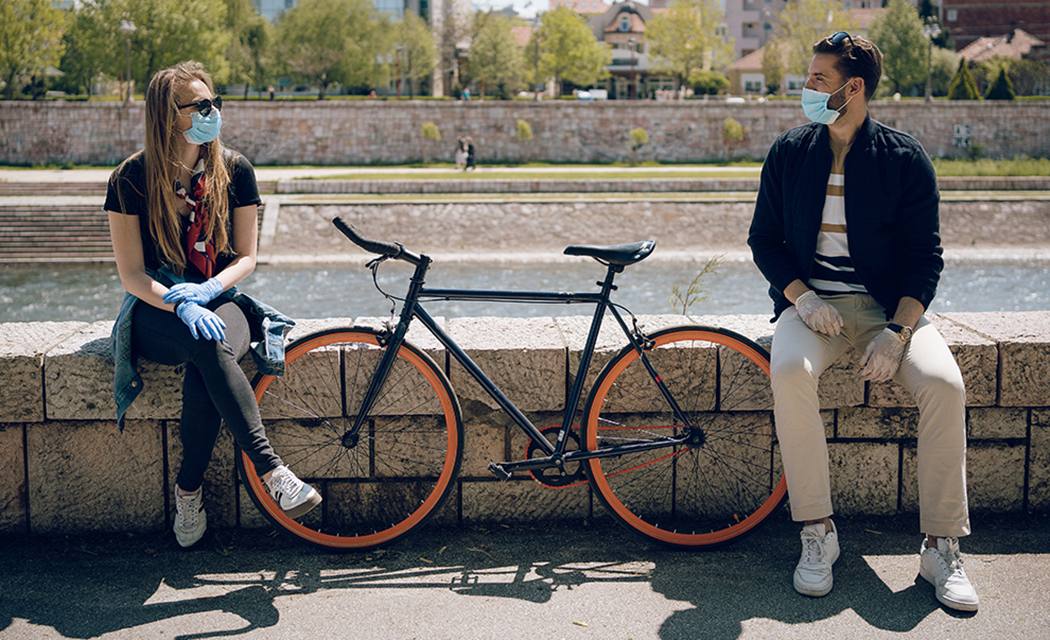
IESE Insight
Stretch assignment: resources for staying well during lockdown
Living life and going to work in the age of coronavirus takes its toll physically, emotionally and mentally. A survey of European workers by IESE's Jeroen Neckebrouck finds those who maintained an exercise routine coped better.
Move it or lose it: a final reflection
By Jeroen Neckebrouck
Did you miss going to the gym during lockdown? Personally, I missed cycling.
The health benefits of physical activity are well-documented, including it being one of the best ways to boost the immune system. It also has psychological benefits. Engaging in physical exercise helps us to switch off, reduces stress and enhances well-being, giving us the detachment from work that we all occasionally need, which will ultimately give us more energy to be effective at work.
In April 2020, at the height of the lockdowns, I surveyed European workers who had been physically active prior to the pandemic to examine their changed habits during the coronavirus lockdowns and the effects on their well-being. Interestingly, 75% of those who maintained some form of physical activity — even in a reduced or different form from what they were doing before — reported having an easier time being able to detach from work.
Continuity matters: Those who exercised more regularly prior to lockdown lost less of their ability to detach when doing physical exercise during the lockdown.
So, whatever activity you were doing before, keep doing it. It's important to develop good habits, especially if we intend to work from home longer term or if there's another COVID wave and we find ourselves stuck indoors again.
If you're currently not doing anything, there's no better motivation than a global health crisis to get started. Experts recommend 2.5 hours a week of moderate-intensity exercise, meaning you should break a sweat but still be able to speak. The type of physical activity doesn't matter as much as actually doing it. It could be as simple as walking or cycling instead of driving, getting off the bus a few stops earlier and walking the final stretch to work, or taking the stairs.
And if it's not possible to go outside and have physical activity in real life together with others, our survey also showed that being active on virtual platforms where you could at least see others — such as doing yoga virtually with a coach or with others online — is also beneficial.
But the key point is: you've got to move.
As the line between work and home blurs, it becomes all the more important that we make time to detach from work. The resources listed here can help you keep your head and stay healthy.
But remember, as much as reading about sports or watching an inspirational video with a world-class athlete may offer respite from work, nothing beats getting up, moving around and practicing the healthy habits and regular physical activities highlighted by these resources. IESE's Jeroen Neckebrouck explains below...
If you're a cycling enthusiast frustrated by lockdowns, then this novel by the famous Dutch writer Tim Krabbe, himself a cyclist, might be for you: It's a loving, imaginative and, above all, passionate tribute to cycling, reflecting what goes on inside a rider's mind as he competes in a French bike race. It has been hailed as capturing the highs and lows of the cycling experience in prose, which ends up being no less than an ode to life.
Learning from adversity: a conversation with Pau Gasol (video in Spanish only)
"We can't control the many things that happen to us in life," says the NBA All-Star Pau Gasol, "but we can control our reaction to them." Gasol reacts with positivity, telling IESE professor Santiago Alvarez de Mon that "we can be nostalgic for how things used to be, or we can evolve and grow." During this 50-minute conversation, Gasol also highlights our interconnectedness as human beings and the need for teamwork.
This is one of dozens of live sessions and open-access resources available at iese.edu/open to inspire the business community to proactively overcome the crisis.
In 2011, Joshua Fields Millburn and Ryan Nicodemus walked away from their corporate careers in search of a simpler life. If the lockdowns got you thinking, like them, of "living a meaningful life with less stuff," then The Minimalists are for you. Their black-and-white site is full of stark truths. Listen to their podcasts or audiobooks while exercising or clearing out the (literal or figurative) clutter in your life.
Intermittent Fasting
Fasting, a spiritual discipline going back to biblical times, has more recently been embraced for its health benefits. There is growing medical support for intermittent fasting (IF), which, rather than going days without eating, consists of time-restricted eating, aligning meal times with circadian rhythms. So, no late-night eating or snacking, and a later breakfast, which is better for metabolism. When combined with a Mediterranean diet and a healthy, active lifestyle, IF has been shown to lower blood sugar and blood pressure, and enhance brain function, not to mention contributing to weight loss. Something to consider for those looking to shed those quarantine kilos. There are numerous apps to help you create your own fasting plan, track health metrics, keep mood journals, and more. Here are three of the most popular:
Guided meditations, articles and videos brought to you by an advertising executive and a sports student turned monk who now work with athletes and business leaders "to demystify the mystical" and "give you tools and resources to look after your mind."
A version of this article is published in IESE Business School Insight 156.
